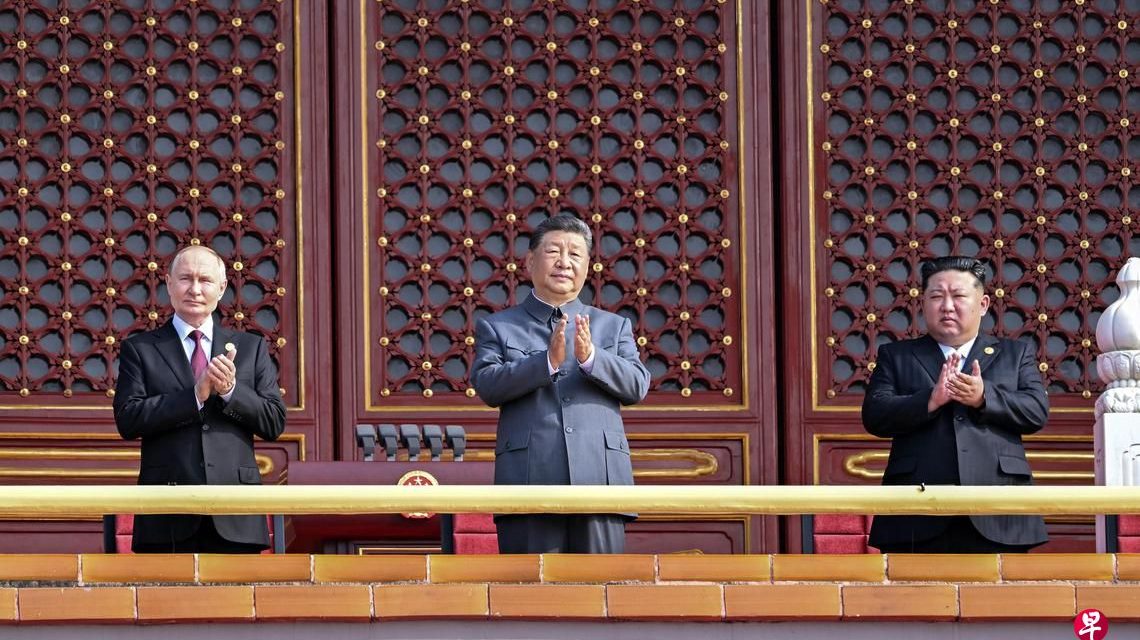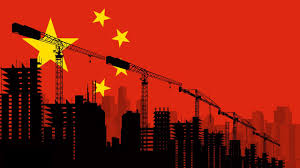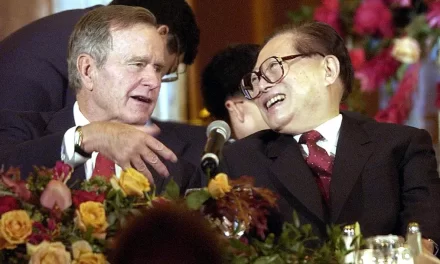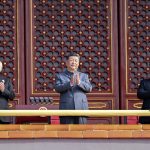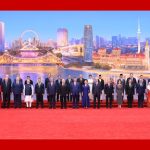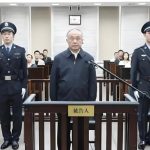By: Jianli Yang
On September 3, Beijing staged China’s largest ever military parade, marking 80 years since victory in World War II. The international spotlight focused on the striking image of Russian President Vladimir Putin and North Korea’s Kim Jong Un flanking Xi Jinping at the center of Tiananmen Square’s rostrum, a tableau meant to broadcast the tightening bonds among China, Russia, and North Korea in opposition to American “hegemony.” That message was unmistakable. Yet another, less-discussed signal emerged from the same stage: the condition of Xi Jinping’s health. Xi’s health is not a private matter. It has profound implications for China’s political stability, economic future, and for the world’s geopolitical balance.
Xi’s performance during the ceremonies—welcoming foreign dignitaries, delivering his speech, reviewing troops, and waving to the crowd—betrayed a visible frailty. He struggled up the steps of Tiananmen, breathing heavily beside Putin, and his speech lacked force and stamina. His body language during the military review appeared listless and fatigued, forming a stark contrast with the display of a powerful, disciplined army marching in unison along Chang’an Avenue. That dissonance—between the strength of the Chinese state’s military machine and the weakness of its supreme leader—was impossible to ignore.
The health of China’s top leader is treated as a state secret. Even in frail old age, Communist Party leaders are cosmetically bolstered to appear vigorous. During Mao Zedong’s final years, his failing health was hidden behind official phrases like “ruddy complexion” and “full of spirit.” The rule of thumb is simple: if a leader appears robust, the truth may be otherwise; if he appears unwell, the decline is real. Xi’s frailty on September 3 was therefore revealing, even alarming.
Western media quickly seized on an extraordinary exchange as Xi and Putin climbed the steps together. Xi remarked that “in the past, people rarely lived to be 70; today 70 is still a child.” Putin replied that biotechnology now allows organs to be replaced, perhaps paving the way toward eternal youth. Xi added, “Some predict that in this century, humans could live to 150.” Their remarks captured more than idle banter: they exposed the dictator’s fantasy of eternal life and eternal rule. For autocrats, the desire for longevity is inseparable from the desire for unending power. Yet no matter how ruthlessly they prevail over rivals, no tyrant can vanquish mortality. Xi’s evident physical decline is an inescapable reminder of that truth: his body, not his ambitions, will ultimately dictate the limits of his reign.
This makes the question of succession ever more pressing. Since taking power, Xi has systematically erased any hint of a designated heir. He understands that once an heir apparent becomes widely recognized, that figure inevitably forms a secondary power center, eroding his authority. Until now, Xi has succeeded in preventing that dynamic. Most observers believe he has no successor in mind. But that cannot be the whole story. Xi is not just a power-hungry leader; he is also deeply invested in securing his political legacy, protecting his family, and ensuring the survival of his policies. His sweeping anti-corruption campaigns and purges have created legions of enemies within the Party and society. For someone who has remade China’s trajectory in ways distinct from his predecessors, the question of what happens after him is not merely academic. Even if he wishes to deny it, his declining health makes succession a looming, unavoidable reality.
History shows that authoritarian succession is inherently destabilizing. The death of a long-ruling dictator often produces not only a crisis of governance but also the opening for profound political change. When Mao died in 1976, fierce power struggles erupted, but his death also ushered in an era of reform that dramatically improved ordinary people’s lives. As some scholars quip: “Chairman Mao was so great that his death made the Chinese people finally eat their fill.” Similarly, the democratic movement of 1989 and the Tiananmen massacre cannot be separated from Deng Xiaoping’s fraught succession planning. Deng’s eventual abolition of lifetime tenure and creation of the two-term, ten-year leadership norm was seen as one of his most important reforms. Under that arrangement, Hu Jintao succeeded Jiang Zemin with relatively mild struggles. Xi, however, upended this fragile equilibrium. In 2018, he amended the constitution to restore lifetime rule, and in 2022 secured a third term, effectively crowning himself emperor. Yet “lifetime tenure” cannot outlast the lifetime of the man himself. When the “life” ends, so does the tenure.
This unresolved contradiction hangs over China’s future. Xi’s rule has confounded those seeking to predict China’s political trajectory. Will it move toward greater openness or deeper authoritarianism? Will it stabilize under centralized control or fracture under hidden tensions? These are not abstract questions. China is the world’s second-largest economy, a nuclear power, and a central actor in global crises from climate change to conflict. Its direction affects us all. Watching the disciplined ranks of soldiers march with flawless synchronicity on Beijing’s avenues, I found myself asking: where are they marching to? What is the destination of this vast and powerful nation? The vision of overwhelming military order paired with the image of a weakened paramount leader embodied the uncertainty of China’s path. The contradiction between the strong state and the frail man at its helm may yet prove decisive.
For now, Xi projects unity with autocratic allies abroad and strength at home through spectacle. But his body tells another story, one that no pageantry can conceal. Autocracy depends on the illusion of invincibility. Xi’s visible weakness punctures that illusion, raising anew the ancient problem of succession in despotic regimes. The world should pay attention. China’s future, and by extension the future of global politics, may turn not on Xi’s grandiose parades or geopolitical maneuvers, but on the limits of his own failing health.
Dr. Jianli Yang
Research Fellow, Kennedy School of Government of Harvard University
Founder and President of Citizen Power Initiatives for China and author of For Us, The Living: A Journey to Shine the Light on Truth and It’s Time for a Values-Based “Economic NATO”.

